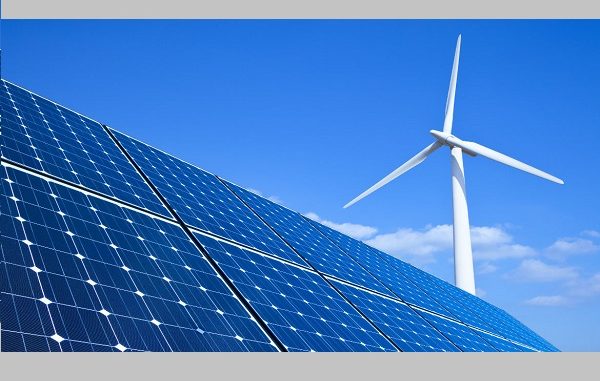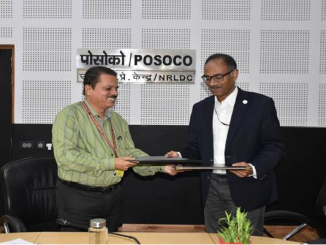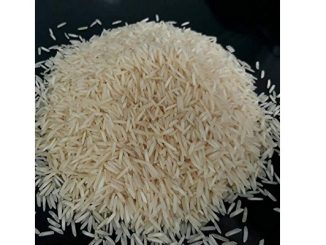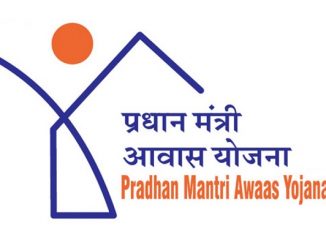
June 23: Shri R.K. Singh, Union Minister of Power, New and Renewable Energy and Skill Development and Entrepreneurship (IC) interacted today through video conferencing with developers of generation and transmission projects in Power and Renewable Energy sector. The Union Power Minister emphasized the importance of the movement for ‘Aatmanirbhar Bharat’ in order to promote manufacturing of goods and services in India and to create jobs.
The Power Minister pointed out that from the data on item-wise quantum of imports in power sector given by DGCI (Directorate General of Commercial Intelligence), Department of Commerce it is seen that many equipment like transmission line towers, conductors, industrial electronics, capacitors, transformers, cables and insulators and fittings etc. in respect of which domestic manufacturing capacity exists, are still being imported. It was emphasised that for promoting Make in India and reducing import dependency, it is essential that developers in the Transmission, Thermal, Hydro, Distribution, Renewables need to join the national campaign of ‘Aatmanirbhar Bharat’ and wholeheartedly adopt the ‘Make in India’ policy of Government of India.
Shri Singh pointed out that Power is a sensitive and strategically important sector, as all our communications, manufacturing, data management and all essential services depend on power supply and any malware may bring down the system. Therefore, ‘Aatmanirbhar Bharat’ has a much higher level of significance for Power sector. Accordingly, he urged all the Developers to take the following pledge:-
- Not to import any equipment/materials/goods in respect of which there is sufficient domestic capacity.
- In respect of goods and services wherein domestic capacity is not available and that import is inevitable then it should be allowed only for a fixed timeframe of 2-3 years during which indigenous manufacturing of these items would be developed by an enabling policy/tax incentives/start-ups/vendor development/R&D support so that in the next 2-3 years all these items get domestically manufactured. Till such time goods so imported shall be tested in Indian laboratories for adhering to Indian standards and also to check the presence of malware.
- In respect of equipments/items required to be imported, the import of such equipments/items from prior reference countries shall be done only after obtaining prior approval of Ministry of Power/Ministry of MNRE.
The Union Minister emphasized that Power is critical infrastructure for development of our country. Everything, including, communication, data services, health services, logistics, defence manufacturing etc. depends on power sector. Therefore, there is a need to reduce dependency on import in the power sector in order to protect safety and security of our country.
The Union Minister further informed the meeting of the Ministry’s proposal to impose Basic Custom Duty (BCD) beginning August, 2020 on solar modules, solar cells and solar inverters. He said that a clear trajectory of BCD would be declared so that there is no uncertainty about government policy. Further, the approved list of models and manufacturers in respect of Renewable Energy will be made effective from October 1, 2020 as declared earlier. This will ensure that all solar power projects which are bid out as per the standard bidding guidelines will be required to procure solar cells and solar modules and other equipment from manufacturers figuring in the approved list. In addition, financing from Power Finance Corporation (PFC), Rural Electrification Corporation (REC) and Indian Renewable Energy Development Agency (IREDA) will be structured in such a manner that lower rates of interest will be charged on the developers who will use domestically manufactured equipments.
He also mentioned recent constitution of an FDI Cell and a Project Development Cell in the Ministries of Power & NRE. The FDI Cell will vet proposals for investment from countries that shares borders with India. The Project Development Cell will hand-hold investible projects so that the process of investment is accelerated. He further informed the meeting that the practice of issuing concessional custom certificates for certain import items in the RE sector will be discontinued from a date that will be specified separately.
During the interaction with the Union Minister, the developers made important suggestions to strengthen domestic manufacturing of power sector equipments in India in the entire value chain, which, inter-alia, include the need for policy certainty, suitable regime for facilitating import of capital goods required for manufacturing of power equipments and the need for availability of finance and power to the manufacturers at competitive rates. They also emphasized the need for clarity on the new and old investments, encouraging the R&D efforts and maintaining the sanctity of contracts. Some of the developers also emphasized that import of critical equipment required for maintenance and overhaul of the existing projects needs to be allowed till such a time the domestic manufacturing capacity for the same is put in place.
The developers from Generation and Transmission side, including developers in the renewable energy sector and also Industry Associations like CII, FICCI, PHD Chamber, Solar and Wind manufacturers echoed with enthusiasm their pledge to contribute to the domestic manufacturing by unanimously and wholeheartedly supporting the idea of ‘Make in India’ and ‘Aatmanirbhar Bharat’ to reduce the dependency on imports and agreed to abide by the pledge suggested by the Union Minister.
The Minister assured the industry participants that suggestions made by them in respect of existing projects, availability of easy credit, etc. will be carefully examined. He directed Secretary, Power & Secretary, MNRE, to look into the concerns of the industry participants.
Source: PIB
Disclaimer: We donot claim that the images used as part of the news published are always owned by us. From time to time, we use images sourced as part of news or any related images or representations. Kindly take a look at our image usage policy on how we select the image that are used as part of the news.


